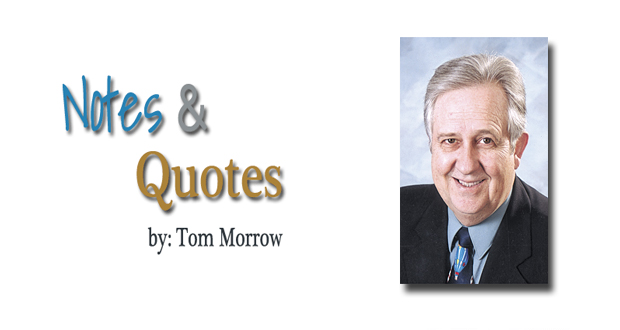‘Salute when you speak to me, son!’
By Tom Morrow
One of Oceanside more colorful and fascinating characters was the late Benjamin A. Records. Well, for sure, he was a character.
Born March 6, 1924, Benny grew up with a twin brother in Riverside. To think there were two like Ben boggles the mind.
Ben was 18 when he joined the U.S. Army Air Corps in 1942, becoming a radioman. This point is important because instead of “flying” into Normandy during the June 6, 1944 D-day invasion, Benny and three other Air Corps lads landed with the very first wave of infantry troops onto Omaha Beach. Their job was to set up a communications post to direct Allied aircraft on bombing targets.
It must have been a harrowing experience wading ashore with all that radio equipment while being fired upon in one of the worst combat zones in the history of warfare.
“Naw,” Ben recalled. “The four of us had .45s (pistols).”
Ben’s team made it safely ashore. Many weeks later, after his unit had moved a number of times, additonal Air Corps personnel were brought in, including a major general (two-star).
“One night two or three of us stole the general’s jeep, went into a French town and got drunk,” Ben admitted. “Somehow he found out about it and was gonna pull an inspection the next morning.”
Later, Ben and his buddies drove the jeep outside of the camp, disassembled it, and buried the jeep in a farmer’s pasture.
“That general nearly went nuts trying to find his jeep,” Ben laughed. “Some French farmer probably had himself a nice Jeep after the war.”
Later, when the Allies were crossing the Rhine River into Germany, Ben’s communication command was encamped on the French side while U.S. Naval personnel, using flat-bottom landing craft, were shuttling troops and equipment across into Germany.
“The guys and officers in my unit never wore our ranks or stripes in combat zones,” Ben recalled. “I was ‘slick-arm’ — a private, so I didn’t have anything to wear, anyway.”
One evening a young U.S. Navy ensign, with his gold bar quite visible, came up and asked Ben where the officer’s quarters were?
Ben chuckled, then casually told him there were “a few foxholes dug along the riverbank” and the officer was welcome to one if he could find it.
“Soldier, don’t you believe in saluting an officer?” the ensign barked back at Ben.
Just then, Ben’s commanding officer, an Army Air Corps colonel, walked up. Seeing that the young Naval officer was trying to pull rank on one of his men, the colonel took action.
“Son, you’d better be careful,” the colonel told the young ensign. “You’re addressing General Benjamin Records, our commanding officer.”
The young Navy ensign snapped to attention, smartly saluted Ben, then did an about face and proceeded down the riverbank to find a foxhole for the night.
When Ben returned home after the War, he became a Riverside County Sheriff’s deputy, among other things, before retiring to Oceanside, but that’s story for another day.
Ben Records died in 2005 after a short illness, but is missed every day by his many friends around Oceanside. He always had a story – and, knowing Ben, some of them were probably true. A character indeed.
 Mr. MALAPROP – Legendary film producer Samuel Goldwin was a pioneer in the industry and a modern-day “Mr. Malaprop.” He was unrivaled in his fractured English. Born in Warsaw, Poland, Goldwin came to America when he was 13. The immigration officer gave him the name of “Goldfish” because it was the closest to his Polish moniker. He later changed his name to “Goldwyn.”
Mr. MALAPROP – Legendary film producer Samuel Goldwin was a pioneer in the industry and a modern-day “Mr. Malaprop.” He was unrivaled in his fractured English. Born in Warsaw, Poland, Goldwin came to America when he was 13. The immigration officer gave him the name of “Goldfish” because it was the closest to his Polish moniker. He later changed his name to “Goldwyn.”
Here are a few of his famous fractured quips:
One of his first “mis-speaks” came when as a young producer facing severe financial problems, he declared himself “…on the brink of an abscess.”
When discussing whether or not to film author Lillian Hellman’s best-selling “The Children’s Hour,” one of his staff members pointed out it wouldn’t be a good idea because the story featured two lesbians.
“I don’t care – we can change that and make them Albanians.”
He accused MGM director George Cukor of “biting the hand off the goose that laid the golden egg.”
A colleague asked Goldwyn in a script conference what the message of the film would be, to which he replied: “I’m just planning a movie. I’m not interested in messages. Messages are for Western Union.”
One of his best: “I want a movie that starts with an earthquake and works up to a climax.”
SCAG SEZ: “You’ve probably noticed that glasses can change one’s
personality and world around them — especially if their emptied too often.” — Cecil Scaglione, Mature Life Features




